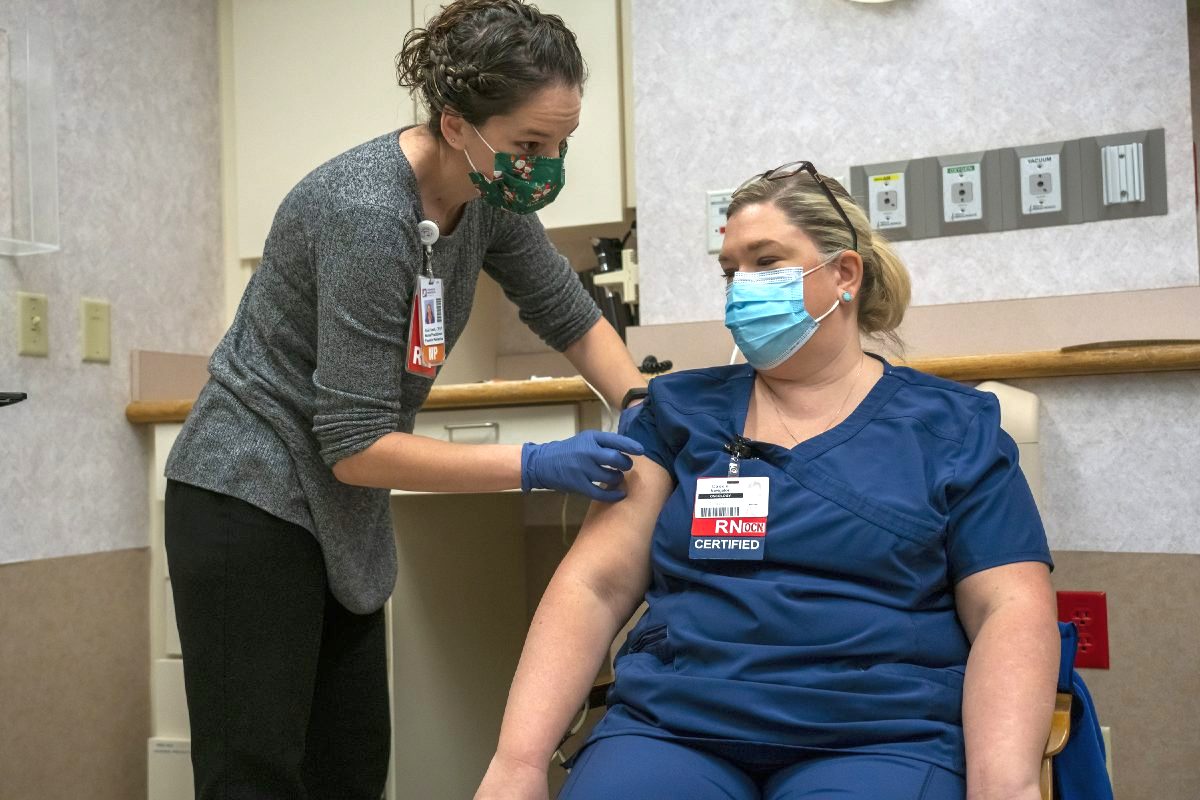Christmas came early for some health care workers who got a COVID-19 vaccine Friday morning at Johnson Memorial Hospital.
About 100 health care workers who live or work in Johnson County were vaccinated Friday, marking the first to be given to those on the frontlines of the pandemic at area hospitals. Johnson Memorial Hospital had 975 doses to give to area health care workers as part of the health system’s first shipment of the Pfizer BioNTech vaccine.
Nearby Community Hospital South and Franciscan Health Indianapolis also began vaccinating employees and those from neighboring health systems Friday.
Each health care worker had been anticipating the vaccine after nine long months of battling the coronavirus. They saw it as a chance to protect their patients, their families and themselves.
[sc:text-divider text-divider-title=”Story continues below gallery” ]
Click here to purchase photos from this galleryHeidi Smith, a pediatric nurse practitioner with Johnson Memorial Health, received the vaccine Friday, then helped to vaccinate others.
During the pandemic, Smith saw many kids with COVID-19 symptoms who later tested positive. Luckily her patients had milder cases and better outcomes than most, she said.
For those kids and her family, Smith was glad to be one person to usher in the beginning of the end of the pandemic.
“It is a little nerve-wracking and exciting to be a part of it. You know, Operation Warp speed,” Smith said. “It is exciting to be a part of that and give it and receive it on the first day.”
Dr. Christopher Zee-Chang, an Indiana University Health Cardiologist who practices at Johnson Memorial Hospital, took a vaccine Friday. Zee-Chang said the vaccine was a gift that can eventually help ease staffing shortages.
“Hopefully, this will minimize my chance of taking care of folks and not getting sick,” Zee-Chang said. “Health care workers getting sick has been a big, big issue across the country. Burnout has also been an issue if coworkers are sick or under quarantine. If we can keep ourselves healthy, we can be available to take care of those who need us.”
Cassie Osborne, an oncology nurse navigator who works at Community Health’s Cancer Center South, was the first to be vaccinated at the Franklin hospital. Osborne, who works daily with vulnerable, immunocompromised patients, was glad to have an extra layer of protection against COVID-19.
Though she doesn’t work directly with COVID-19 patients, her work has changed during the pandemic. On top of arming cancer patients with resources to get through their cancer journey safely, she also shares best practices to minimize their risk of COVID-19 infection.
“Now that we are seeing patients again in the clinic, they have a lot of questions (about COVID-19),” Osborne said. “Trying to keep them out of the emergency room is our big thing. We are making sure they are staying healthy and educating them.”
The vaccinations began on a day when COVID-19 patient levels were the highest they had been in a week, at 14. Despite the increase in patients, there was a light at the end of the tunnel, said Dr. David Dunkle, Johnson Memorial Health president and CEO.
“You can feel the momentum changing. We really truly have a weapon against this disease,” Dunkle said. “You can sense the excitement walking in. This is a fantastic day.”
Dr. Craig Moorman, Johnson County health officer, felt the joy and excitement, too. However, he warned the public that the pandemic is still far from over.
“People also have to understand this won’t go away overnight. The peak immune response isn’t there until about a week after the second dose,” Moorman said. “So you can’t go out with reckless abandon right after you get a shot in the arm. You can’t go out like this is done and start doing things you haven’t done in months. But it gives us some hope. We know it will have a positive impact.”
Moorman expects to see a gradual improvement in case levels and deaths as more people get vaccinated, but said Johnson County won’t be out of the woods for many more months. This is because vaccine doses are very limited and may not make it to the general public for months.
“You could guess and you’d be wrong. Don’t expect it at a certain time. Just be patient; it will happen,” Moorman said. “In the meantime, just keep doing the same things we’ve been doing.”
Moorman is scheduled to get a shot today and encouraged the public to do the same when their time comes. Though development of the the vaccine was rushed, it is safe, he said.
Though the mRNA vaccine is the first to be approved, the technology has been around for more than 20 years. Instead of injecting a dead virus, the mRNA vaccine uses an mRNA protein to teach the body’s cells how to fight off the virus.
“The concept was developed in the 1990s. It was developed for SARS and MERS but then it got shelved because those were contained and didn’t become a pandemic,” Moorman said. “So this technology was out there and they took it off the shelf again when this showed up and started working on it.”
[sc:pullout-title pullout-title=”Pull Quote” ][sc:pullout-text-begin]
“People also have to understand this won’t go away overnight. The peak immune response isn’t there until about a week after the second dose. So you can’t go out with reckless abandon right after you get a shot in the arm. You can’t go out like this is done and start doing things you haven’t done in months. But it gives us some hope. We know it will have a positive impact.”
— Dr. Craig Moorman, Johnson County health officer
[sc:pullout-text-end]





